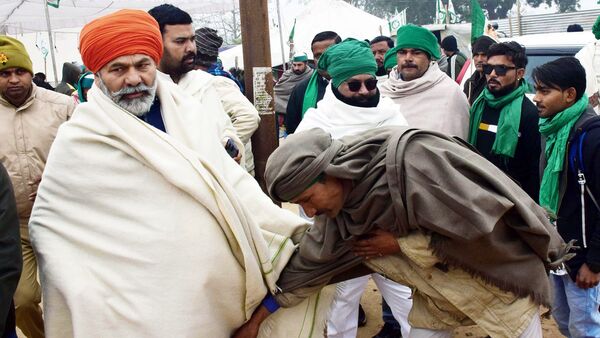As the farmers’ protest in India intensifies with the ‘Delhi Chalo’ movement gaining momentum, the absence of Rakesh Tikait, a prominent leader of the protest, from the main protest site today has sparked speculation and raised eyebrows. Tikait, the spokesperson of the Bharatiya Kisan Union (BKU), has been a central figure in galvanizing farmers’ support and mobilizing mass demonstrations against the contentious agricultural laws passed by the central government. However, his absence at today’s main protest has left many wondering about the reasons behind his sudden withdrawal from the forefront of the agitation.
One plausible explanation for Rakesh Tikait’s absence could be related to recent developments within the protest movement. Over the past few days, there have been reports of internal divisions and disagreements among various factions of the protesting farmers, leading to concerns about the unity and cohesion of the movement. It’s possible that Tikait’s absence is a strategic move aimed at addressing these internal rifts and fostering greater solidarity among the protesting groups.

SOURCE:- INDIA TODAY
Another factor to consider is the escalating tensions between the farmers and the government, particularly in light of the recent clashes with security forces at the borders of Delhi. The authorities have intensified their efforts to suppress the protest, deploying additional security personnel and erecting barricades to prevent farmers from entering the national capital. In this charged atmosphere, Tikait may have decided to step back temporarily to avoid further escalation and maintain a peaceful stance.
SOURCE:- NEWS18
Furthermore, personal or health-related reasons could also account for Rakesh Tikait’s absence from today’s main protest. Leading a movement of this scale is physically and emotionally taxing, and Tikait may have needed time to recuperate or attend to other pressing matters. Given the relentless nature of the protests and the immense pressure on its leaders, periodic breaks or moments of respite are not uncommon.
Despite Rakesh Tikait’s absence, the farmers’ protest continues unabated, with thousands of farmers braving harsh weather conditions and logistical challenges to press for their demands. The movement has garnered widespread support both within India and internationally, with solidarity demonstrations held in various parts of the world.
In conclusion, while Rakesh Tikait’s absence from today’s main protest may have raised questions and speculation, it is important to recognize that the farmers’ movement is larger than any single individual. The protests represent a collective effort by millions of farmers across India to protect their livelihoods and assert their rights. As the movement progresses, the focus should remain on addressing the grievances of the farmers and finding a sustainable resolution to the ongoing crisis.
Share your views in the comments

